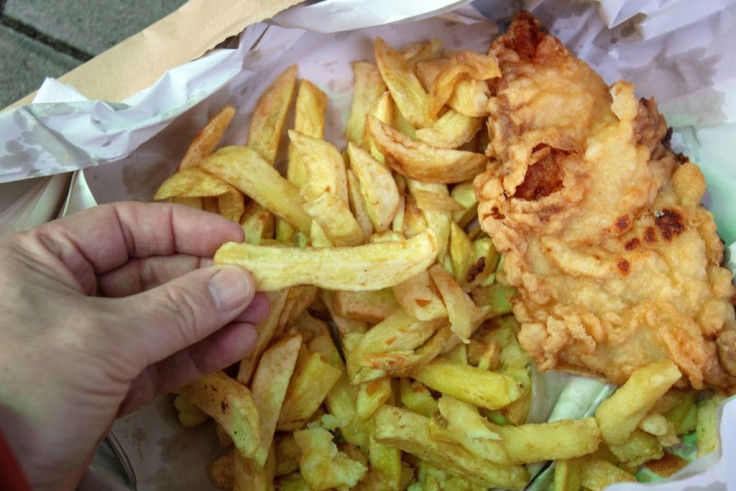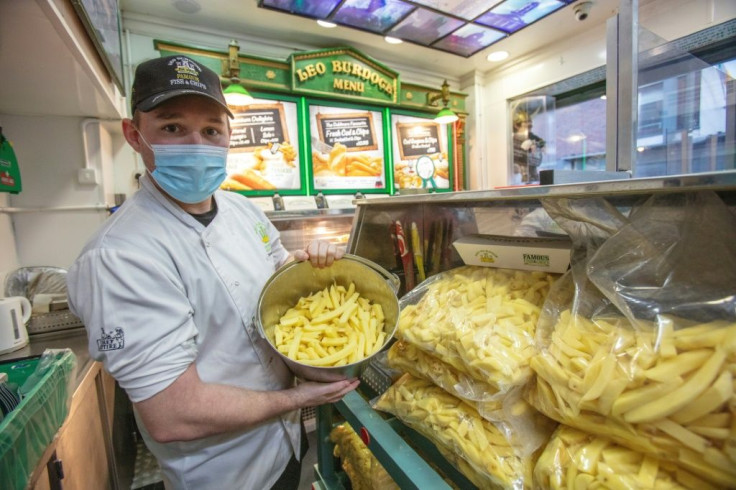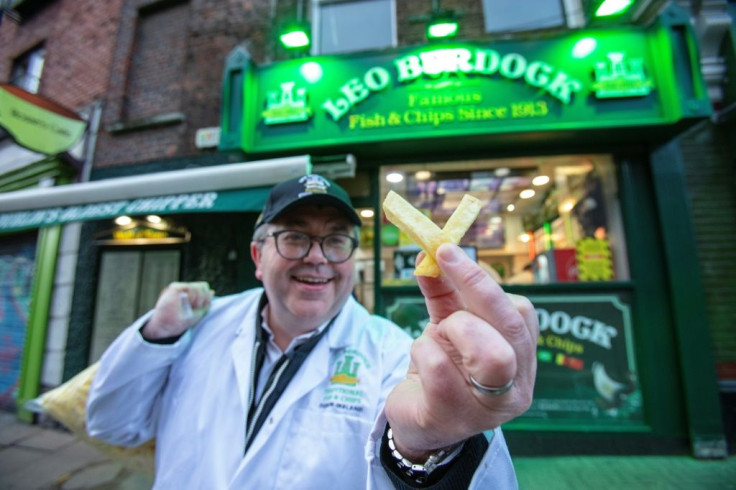Chipping Forecast: Ireland Fears Brexit Blight On Spud Supply
In Dublin's oldest chip shop, a pile of British potatoes plunges into a scalding vat of amber oil and under its roiling surface, everyday alchemy creates a cherished deep-fried treat.
"A lot of people have called us the gold standard of fish and chips," boasted Derek Duggan, area manager of chip shop chain Leo Burdock.
Though the Irish are renowned consumers of the crop, imported British potatoes are the preferred staple for chips in the Republic, creating golden-brown fries which are crisp on the outside yet fluffy within.
But the Irish government warned traders in October that importing potatoes from Britain will be prohibited when the Brexit transition period wraps up at the end of the year.
"The current situation is problematic, because there's a questionable supply now for January," Duggan told AFP as staff at the chain's central Dublin branch served the suppertime rush.

Britain left the EU in January, but under the terms of a divorce deal relations stay the same until December 31, while the two sides agree the terms of their new relationship.
London and Brussels are locked in last-minute talks to secure a post-Brexit trade deal, but there are fears they will be out time for it to be ratified for January 1.
"It's no secret stuff that both sides, I think, are running out of time," Irish foreign minister Simon Coveney said Thursday.
A no-deal would see Britain revert to World Trade Organization terms with the bloc, with tariffs and quotas, disrupting cross-border trade.
In October, Ireland's agriculture ministry warned potato traders that the import of potatoes from Britain will be banned at the end of the transition period.

The UK is seeking approval to export as a "third country" but "this application must go through the EU law-making process", the notice said.
"The EU has indicated this process will only begin upon the completion of trade negotiations," it said.
If imports are banned it would end the annual flow of 80,000 to 100,000 tonnes of potatoes from British fields to Irish deep fat fryers in takeaway outlets locals call "chippers".
At Leo Burdock, which has operated since 1913, that could be bad for business.

Deftly avoiding hot spitting tanks of oil, two staff parcel stacks of fish and chips with the flair of cocktail bartenders -- sprinkling salt and drenching vinegar to order.
But stacked behind the shiny chrome counter is a stock of freshly-cut British chips which may soon dry up.
"The Irish home-grown market do produce great potatoes," Duggan said.
But he said farmers in the Republic do not produce the type or quantity needed to feed Ireland's insatiable appetite.
To a connoisseur, there is a marked difference between British spud variants and their Irish counterparts.
"If you wanted to get into viticulture, it would be like having a Sauvignon blanc from New Zealand as opposed to France," joked Duggan.
Dressed in the white-coat uniform of a "chipper," he explained the high science behind crafting the perfect chip -- measuring sugar levels, "dry matter ratio" and the chemical reaction in the piping hot fryers.
The difference in the soil and agriculture techniques is said to yield a subtle but tangible difference to discerning taste buds.
One major hitch in Brexit trade talks remains access to British fishing waters -- an emotive and symbolic for the island nation.
London reportedly wants to cut EU access to its waters by 80 per cent, while the EU is only willing to accept 15 to 18 per cent, according to a Brussels source.
Irish boats fear under a "no-deal" scenario they will be locked out of British waters, where fish are currently considered "shared stocks" by Dublin.
That could change their catches, altering menus at Irish chippers where battered fish is the preferred pairing with British chips.
But if fisheries are an emotive issue for Britain, potatoes carry a special significance in Ireland, where they have been a staple food in the historically poor country.
The notorious "potato famine" of 1845 to 1849 -- caused by successive crop failures -- saw one million die and some two million escape through emigration.
Potatoes still remain a central icon of the Irish diet. Could Brexit change all that?
"We will adapt and we will deal with whatever comes our way," pledged Duggan.
"But we're hoping that people, especially politicians in the UK, will come and see sense."
© Copyright AFP 2024. All rights reserved.





















